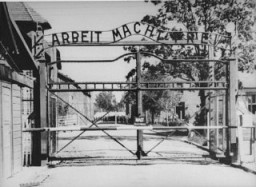You searched for: P2P交易平台定制【TG���������@EK7676】平台包网搭建P2P交易平台定制【TG���������@EK7676】平台包网搭建7gTADGOavz
<< Previous | Displaying results 171-180 of 245 for "P2P交易平台定制【TG���������@EK7676】平台包网搭建P2P交易平台定制【TG���������@EK7676】平台包网搭建7gTADGOavz" | Next >>
-
Moses Rechnitz
ID CardThe younger of two children, Moses was born to Jewish parents living in the southwestern Polish town of Bedzin. When he was 7, his family moved to the nearby city of Katowice where his father had a wholesale leather business. The Rechnitzes lived in a three-bedroom, upper-floor apartment on Jordana Street. Moses attended a Polish elementary school and also received religious instruction. 1933-39: In secondary school, Moses was one of the only Jewish pupils. He first encountered antisemitism when a teacher…
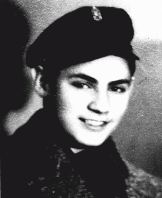
-
Adela Low
ID CardAdela, known as Udl to her family, was one of four children born to a Jewish family in the Polish town of Ulanow. Her father was a landowner and cattle merchant, transporting calves from the Ulanow area for sale in other towns in the region. From the age of 3, Adela attended a private religious school for girls where she learned Jewish history and Hebrew. At age 7 she began public school. 1933-39: Adela came from a charitable family; when her mother baked challah, a special bread for the Jewish Sabbath,…
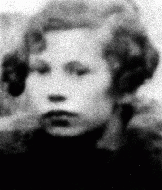
-
Herschel Low
ID CardHerschel was the oldest of four children born to a Jewish family in the Polish town of Ulanow. His father was a landowner and cattle merchant who transported calves from the Ulanow area for sale in other towns. Herschel attended a religious school from the age of 3, and started public school at age 7. 1933-39: Since Herschel was skilled with his hands, his father got him a job weaving reed baskets after he graduated from high school. Herschel was also a member of a Jewish youth organization, Benei Akiva,…
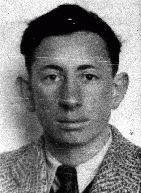
-
Mieczyslaw (Marek) Madejski
ID CardMieczyslaw was the eldest of three sons born to well-to-do Roman Catholic parents in Poland's capital of Warsaw. His father was a real estate developer and his mother was a housewife. Mieczyslaw, or Mieteck as he was nicknamed, began attending public elementary school in 1930 when he was 7 years old. 1933-39: Mieczyslaw's father urged him to study either German or Russian because he thought it was likely that there would be a German or Soviet invasion. Germany invaded Poland on September 1, 1939. During…
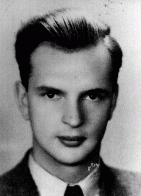
-
Refugees Today
ArticleAs of mid-2022, there were about 27 million refugees. Learn more about these refugees, the violence they face, and the global impact of the refugee crisis.
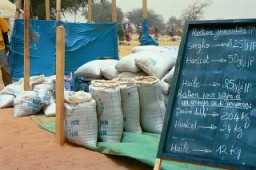
-
Dismissal letter from the Berlin transit authority
DocumentA letter written by the Berlin transit authority (Berliner Verkehrs Aktiengesellschaft) to Viktor Stern, informing him of his dismissal from his post with their agency as of September 20, 1933. This action was taken to comply with provisions of the Law for the Restoration of the Professional Civil Service. On April 7, the German government issued the Law for the Restoration of the Professional Civil Service (Gesetz zur Wiederherstellung des Berufsbeamtentums), which excluded Jews and political opponents…
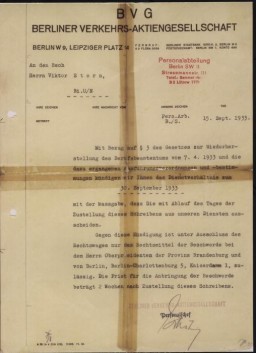
-
Roosevelt announces aid for Britain
FilmAlthough constrained by powerful isolationist sentiment in the United States, President Roosevelt was determined to help democratic Great Britain continue the war against Nazi Germany. Even as he promised to keep the United States neutral in the European war, Roosevelt ordered the expansion of military construction and pledged--as shown in this footage--that the United States would serve as the "great arsenal of democracy." In March 1941, Congress approved Lend-Lease aid for Britain. Britain ultimately…
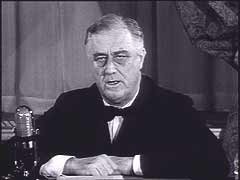
-
Defeat of Nazi Germany, 1942-1945
MapBeginning in 1938, the Nazis increased their territorial control outside of Germany. By 1942, three years into World War II, Nazi Germany reached the peak of its expansion. At the height of its power, Germany had incorporated, seized, or occupied most of the continent. However, also in 1942, the Allied Powers started to systematically bomb Germany. They would continue to do so until Germany's surrender in 1945, weakening the war effort and demolishing cities. Slowly, the Allied Powers began pushing…

-
Elie Wiesel Timeline and World Events: 1928–1951
ArticleSurvivor Elie Wiesel devoted his life to educating the world about the Holocaust. Learn about key events in the world and his life from 1928–1951.
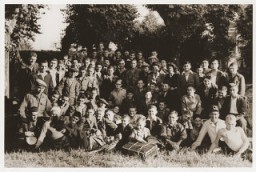
-
Auschwitz: Key Dates
ArticleExplore a timeline of key events in the history of the Auschwitz camp complex in German-occupied Poland.
